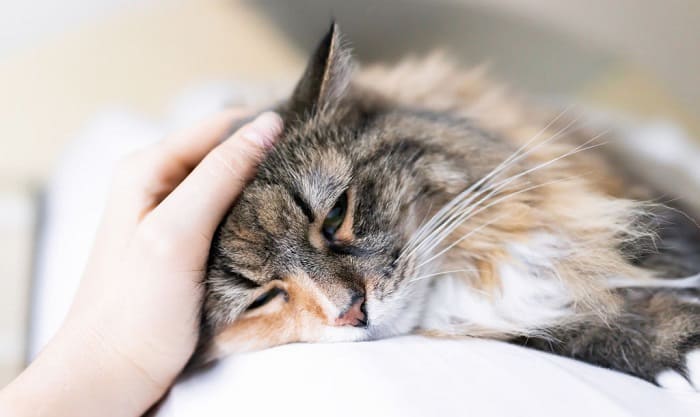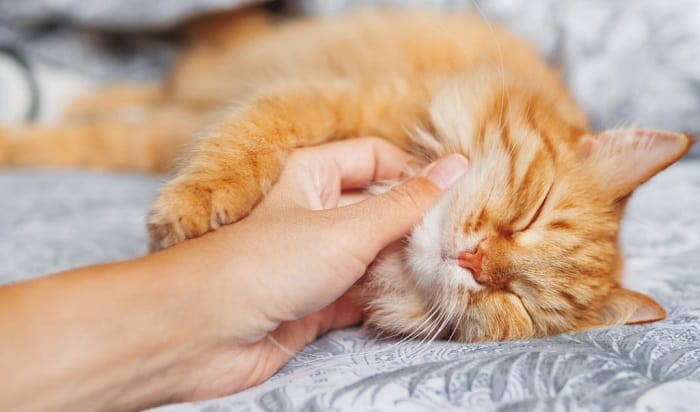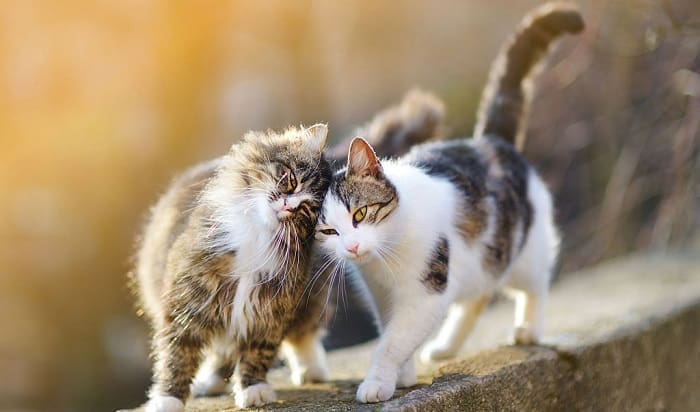It is a common association between a cat’s contentment and its purring. Thus, you might find your cat purring so many times while playing outside or with their neighbor’s cats.
Some people love cats because of their cheerful and luxurious purring sound. I also find that sound so helpful whenever I am under great stress; it is so relieving and stress-reducing.
However, it can be concerning when your cat is not purring for a while. You may start to wonder why my cat doesn’t purr. Well, there are several explanations for this phenomenon of your cat not purring as it usually would.
Therefore, in this article, I will give you six potential reasons to answer your inquiry of “Why doesn’t my cat purr?” Let’s first go through what I’m going to discuss:
- It is commonly believed that purring is produced through the vibration of your cat’s vocal cords during the process of inhaling and exhaling.
- There are a variety of benefits when a cat purrs, such as pain relieving, bone growing, stress-reducing, etc.
- Some cats don’t purr because of their communication style, feral origin, and age. But this can also indicate that your cat is stressed or their vocal cord is injured. Most cases though, you’re just not hearing it.
- Petting, cuddling, talking to them, or creating an appropriate environment are some things you can try to encourage your beloved friend.
Before discovering why your kitten doesn’t purr, let’s learn how purring in cats works!
Table of Contents
Understand the Mechanism of Purring
It is widely accepted that purring stems from the vibration of the feline’s vocal cord when they exhale and inhale. If this hypothesis is correct, there is a likelihood that your cat will stop purring because its vocal cord is damaged.
In addition, it is quite interesting to know that feline animals that can roar, such as tigers, lions, leopards, and jaguars, cannot purr. This is because their larynxes have a surrounding structure that is not stiff enough to produce the purring sound.
For a better understanding, check out this video.
What Are the Advantages of My Cat Purring?
As I have mentioned above, there are numerous advantages of your beloved cats purring. First of all, the frequency of around 25 to 150 vibrations every second is beneficial for the cats’ bone growth, pain-relief, and wound-healing.
Secondly, since kittens are born deaf and blind, these newborns usually rely on their mother’s purring to lead them toward their milk source. Additionally, some cats use their purr to attract their owner’s attention, which is called the “soliciting purr”.
Last but not least, cat purring is known to lower stress level, blood pressure and the risk of having a heart attack. It’s believed that purring will help release endorphins that pacify themselves. For this reason, cats not only purr when they are content but also when they feel under the weather or are in stressful circumstances.
Regarding the effect of a cat purring on humans, it has been proven to alleviate depression and relieve stress. Additionally, the pitch of a cat purr stimulates the growth in our bones and muscles. Thus, having a cat at home seems to be a therapeutic way to relax after a hard day at work.
Is There Anything Wrong When My Cat Doesn’t Purr?
When my cat stopped purring several weeks ago, I did some research on the Internet to see what was going wrong. And now, I’m passing my knowledge to those who might need it. In general, there are six possible causes of why your feline friends aren’t purring.
1. Differences in Communication Style
People have so many methods of communicating, and so do cats. Apparently, each cat is unique, and they have their own preference of communication. Therefore, it may just be your cat’s idiosyncrasy for not purring.
Besides purring, cats can express themselves through facial expressions, body language, or other means of vocalizations such as meowing. For instance, my cat never purrs to show his delight but constantly runs around the house for a couple of minutes. Thus, different cats have different ways of expression, and as their owners, you will notice this after spending quality time with them.
2. Feral Origin
Another reason why your cats barely purr is because of their origin. Cats whose parents are feral are often taught not to purr as they are afraid of attracting predators with that sound.
Moreover, it is found that wild cats are generally quieter than domestic cats since wild cats don’t form a close bonding with humans. On the other hand, domestic cats spend a significant amount of their life with humans. Thus, their sense of sociability is considerably better than feral ones, and consequently, they are better at using sounds to deliver their thoughts.
3. Vocal Cord Damage
Having injuries to their vocal cords is the third cause that may lead to your cat suddenly not purring. Recall from the first section; it is thought that cat purring stems from their larynx – a technical word for cat’s “voice box”.
As a result, every small damage to this part of their body will prevent your cat from making its adorable vibration. Many medical conditions can negatively affect the larynx, such as cancers, abscesses, trauma, muscle disorders, autoimmune disease, or hereditary paralysis.
Bring your cat to the vet for a medical check-up to have a more accurate diagnosis, and don’t worry too much since most of these illnesses can be treated. Ask your vet for further guidance.
4. Sickness or Stress
Similar to the previous reason, being stressed or sick can make your cat temporarily stop purring. Normally, cats in great pain go silent to hide their pain from predators. This ensures that the predators won’t know that the cats are in their most vulnerable state.
Moreover, if your cat is experiencing some types of stress, you might find them not purring and being more withdrawn or aggressive. This probably resulted from a change in environment, routine, or food. Once again, consult your vet to have better guidance of what you should do to help your cats adapt to these changes.
5. Elderly Cats
Just like humans, cats tend to be quieter as they grow up. Since they become slightly weaker, this affects their vocalization abilities, which makes their purr much softer, or they may completely stop.
Nevertheless, there are cases when senior cats become more talkative as they express more discomfort. Thus, my best advice is to get to know your cats well enough so you can recognize what is happening to them as they grow older.
6. You Missed It
The last cause that explains why you don’t notice your cats purring is because you miss it. Some cats like to purr gently, and apparently, you not hearing it is a normal thing.
Nonetheless, there is a way for you to check if your cat is purring. Press your hand against his throat, right under the chin. If your cat is purring, you may feel a soft rumble against your palm.
What Can I Do to Encourage My Cat Purring?
It is not difficult to promote a habit of purring in your cats if you apply some of the following tricks. Firstly, pet your cat more frequently. By this, I mean gently stroke your friends behind their ears, under their chins, or on their backs. Additionally, you can take this further by cuddling your pets while they are resting.
Talking with your pets can also encourage more communication between you and them, which will induce their purring to show their feelings. Furthermore, creating the right environment is a good way to prompt their purring.
Let your feline lay on a soft place, such as your leg, a blanket, or your couch. Make sure you are not looking into their eyes for a long time since cats regard this as a sign of aggression. Repeat these actions many times, and you will see a difference.
Conclusion
I hope the six reasons above satisfy your inquiry of “Why doesn’t my cat purr?” Generally, it can be due to their sickness, nature, or characteristics. Yet, you can encourage their purring in several ways.
Let me know your thoughts in the comment section. If you find this article helpful, share it with your friends and family as well.
Read more: Reasons why my cat purr so loud.

I am Amy Sawy, a Doctor of Veterinary Medicine (DVM) graduate from the University of Kansas. y husband, Dr. Plummer, and I own a veterinary clinic in Phillipsburg, Kansas. In addition to my professional background, I am a devoted pet owner myself, with a household that includes dogs, rodents, and most notably, cats – a total of five felines in my home.
In 2020, I joined an organization as a professional writer, leveraging my experience and collaborating with my team to deliver the most valuable information for your cat’s care.












